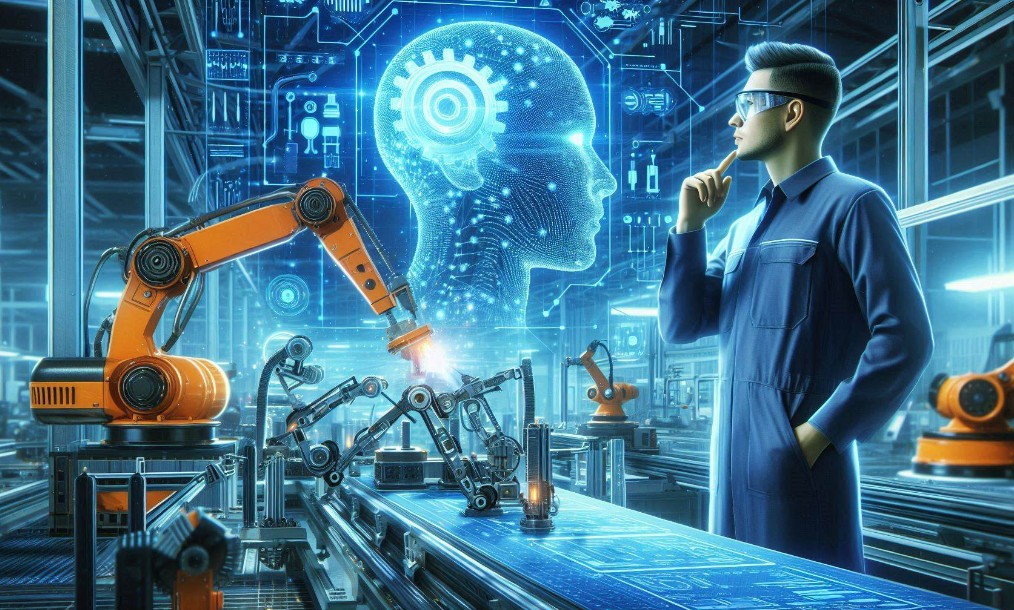In recent years, there has been a significant advancement in the field of Artificial Intelligence (AI) and Augmented Reality (AR). These technologies have become increasingly popular and have the potential to enhance virtual experiences in various fields such as gaming, education, healthcare, and...
AI in Manufacturing How Machines Make Work Faster and Safer

In recent years, artificial intelligence has begun reshaping the way industries operate, bringing about significant advancements in productivity. With the integration of advanced algorithms, businesses are able to streamline complex operations, reducing human error and enhancing precision in various tasks. The technology is proving to be a key player in optimizing performance across different sectors.
Automation is at the forefront of this transformation, enabling companies to achieve greater consistency and reliability in their processes. The ability to analyze large datasets in real-time allows for informed decision-making, improving both the speed and quality of outcomes. As a result, industries can achieve previously unattainable levels of efficiency.
Beyond efficiency, AI also contributes to a safer environment within facilities. By taking on high-risk tasks, AI-driven systems minimize the need for human intervention in potentially dangerous situations, thereby reducing the likelihood of accidents. The combination of increased productivity and safety is setting new standards in operational excellence.
AI Transforming Manufacturing Processes
Artificial intelligence is revolutionizing industrial operations by introducing sophisticated tools that enhance efficiency and precision in various sectors. Through the integration of algorithms and intelligent systems, industries are able to improve productivity and consistency across their operations. The ability to process vast amounts of data in real-time empowers organizations to optimize processes and reduce inefficiencies, resulting in streamlined production flows.
The application of AI extends to many stages of industrial tasks, from supply chain management to quality control. By implementing automated systems capable of making decisions based on data analysis, companies can achieve better resource allocation and waste reduction. This transformation is not just about speeding up tasks, but also ensuring more reliable outcomes in less time.
Below is a table showcasing key areas where AI is influencing industrial operations:
Process Area AI Application Impact
| Production Scheduling | AI-driven predictive models | Optimizes timing, reduces delays |
| Quality Assurance | Automated visual inspections | Improves product consistency, minimizes defects |
| Supply Chain Management | AI-based demand forecasting | Enhances inventory control, reduces stockouts |
| Maintenance | Predictive maintenance systems | Prevents costly breakdowns, increases uptime |
Boosting Efficiency with Smart Machines
Advanced technology has introduced intelligent systems that can perform repetitive tasks with unmatched accuracy and speed. These systems analyze data in real-time, predict potential issues, and optimize the entire production cycle. By leveraging automation, companies reduce human involvement in mundane tasks, allowing employees to focus on higher-level activities while increasing overall productivity.

Enhancing Decision-Making Through Data
By processing vast amounts of information, smart systems can generate valuable insights that help improve operational decisions. Predictive analytics, powered by artificial intelligence, identify patterns and suggest improvements to various processes. This allows businesses to adapt quickly to changing demands, optimize resource usage, and minimize delays.
Reducing Energy Consumption
Efficiency isn't limited to productivity alone. Intelligent systems are also able to optimize energy usage by adjusting equipment performance according to real-time needs. This not only reduces operational costs but also contributes to sustainability efforts by lowering overall energy consumption.
Ensuring Workplace Safety Through Automation
Automation plays a crucial role in enhancing safety standards within industrial environments. By replacing or assisting human involvement in hazardous tasks, intelligent systems help reduce the likelihood of accidents. These systems are designed to handle dangerous operations with precision, ensuring that workers are kept out of harm’s way while maintaining high levels of productivity.
In addition to eliminating physical risks, automation provides real-time monitoring and alerts, enabling quick responses to potential safety issues. This proactive approach not only improves worker protection but also ensures compliance with safety regulations, minimizing risks associated with manual error or oversight.



